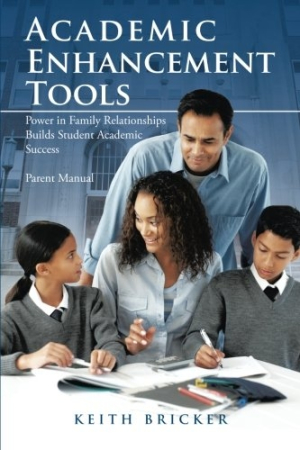
Academic Enhancement Tools
Power in Family Relationships Builds Student Academic Success: Parent Manual
Educator lays a path for education as a means of finding a career.
Parents should serve as the “power source” for student success, claims Academic Enhancement Tools: Power in Family Relationships Builds Student Academic Success, a book based upon several revealing assertions. They include that schools “should never move without the parents’ direct involvement,” schools should “not have the profit factor as an incentive for success,” academic and business communities using a common language is “essential,” and material in schools should be “determined by international work needs.”
Author Keith Bricker served more than forty years as a public-school and college instructor and as a high-school guidance counselor before writing his first book. He provides websites to assist students with academic matters and information on how to set up career “shadowing” experiences—both helpful inclusions. But the volume contains no activities to improve study methods, test-taking skills, or student-teacher interactions. Instead, it contains activities to help parents guide adolescents in choosing a career path. Certainly preparing for the world of work is one important goal of education, but it is not the sole purpose.
The book’s activities are presented in a fashion not likely to ignite student interest. The activities center on making lists, choosing descriptive words from the author’s lists, and brainstorming with family members. The text includes no pictures or other graphics. It’s hard to imagine that young people raised in the age of technology will be drawn to Academic Enhancement Tools. It’s even more difficult to believe they will follow advice such as this: “Put [your] competencies on a three-by-five card written in pencil. Keep this list in your wallet. When doing class work, school activities, or your hobby and a competency that is not on your list is evident, add that competency, and erase the weakest competency on the list.” Such activities should be adapted to suit a modern adolescent audience.
Also, the book’s sometimes obfuscating language may leave readers scratching their heads—for example, “As a parent, it is reasonable to take advantage of what works because of the age span of the student,” and “Schools need to encourage the student in the short run through passionate and caring teachers. We are quick to allow the school to do it—big mistake.”
The book’s cover depicts a family happily working together on homework assignments. Dad’s paternalistic portrayal foreshadows the book’s mantra that students’ academic achievement should be “managed by the family CEO.” The Father Knows Best illustration also presages the fact that female pronouns are absent, much out of keeping with twenty-first-century standards.
Academic Enhancement Tools may appeal to families guided by corporate philosophy. However, this book is not for parents who value the academy for its ability to educate the person for purposes beyond employment.
Reviewed by
Nancy Walker
Disclosure: This article is not an endorsement, but a review. The publisher of this book provided free copies of the book and paid a small fee to have their book reviewed by a professional reviewer. Foreword Reviews and Clarion Reviews make no guarantee that the publisher will receive a positive review. Foreword Magazine, Inc. is disclosing this in accordance with the Federal Trade Commission’s 16 CFR, Part 255.
